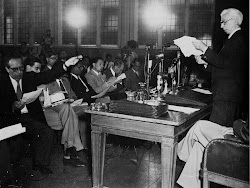Thursday 3 September 2009
Hideki Yukawa
http://science.howstuffworks.com/hideki-yukawa-info.htm
Wednesday 8 July 2009
McNamara and Pugwash--From PENNSYLVANIA to a NWFW
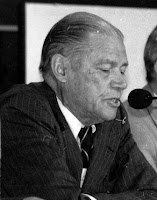
Robert McNamara, who died 6 July 2009 at the age of 93, will be remembered by the Pugwash movement for his efforts for peace and a nuclear weapons free world during the final decades of his life.
Pugwash: McNamara’s Last Effort for Peace in Vietnam?
His importance to the Pugwash movement began long before he himself was a “Pugwashite”. While he was still Secretary of Defense, McNamara was responsible for convincing President Johnson to allow him to take personal charge of a secret Pugwash back channel to Ho Chi Minh that sought to end the Vietnam War.
The background to this initiative (code named PENNSYLVANIA) began at a June 1967 Pugwash meeting in Paris, attended by three scientists from France, three from the US, two from the Soviet Union, and Joseph Rotblat as Secretary General, where a “formula to stop the escalation of the war” emerged. Henry Kissinger, one of the US participants, was also then a consultant to the US President. It was ultimately decided that two Frenchmen, Herbert Marcovich and Raymond Aubrac, a hero of the French Resistance, would take a message directly to Ho Chi Minh. This was possible because Ho Chi Minh was friends with Aubrac and godfather to Aubrac’s daughter. They spent four days in July in Hanoi and met with Ho Chi Minh and the Prime Minister Pham Van Dong and other officials. Upon their return, they were debriefed in Paris by Kissinger. McNamara then gave Kissinger the following instructions, which were approved by the President on 11 August 1967:
MEMORANDUM FOR DR KISSINGER
You may give your contacts the following message and ask that they deliver it to Pham Van Dong:
The United States is willing to stop the aerial and naval bombardment of North Vietnam if this will lead promptly to productive discussions between representatives of the U.S. and DRV [Democratic Republic of (North) Vietnam] looking toward a resolution of the issues between them. We would assume that, while discussions proceed either with public knowledge or secretly, the DRV would not take advantage of the bombing cessation or limitation. Any such move on their part would obviously be inconsistent with the movement toward resolution of the issues between the U.S.
and DRV which the negotiations are intended to achieve…
The U.S. is ready to have immediate private contact with the DRV to explore the above approach or any suggestions the DRV might wish to propose in the same direction. (1)
In a briefing in Paris with Chester Cooper and Henry Kissinger, the Frenchmen asked for a signal to be sent to the Vietnamese of the serious intent of the U.S. On 19 August the President agreed to suspend bombing within a 10-mile radius of Hanoi from 24 August to 4 September to ensure the safety of Aubrac and Marcovich when they were to go back to Hanoi and also to signal Kissinger’s validity as an intermediary.(2) However, something went wrong, and on 20 August there were 200 “weather backed up” sorties flown, “more than any previous day in the war” according to McNamara. He wrote, “Once again, we had failed miserably to coordinate our diplomatic and military actions.”(3) Their second visit was cancelled and while the channel stayed open through October, these negotiations in the latter half of 1967 failed. McNamara, however, credited them with laying the groundwork for the San Antonio accords, “the foundation for the start of the negotiations between North Vietnam and the U.S. in Paris.” (4)
This sentiment is backed up by Vietnamese sources in an interesting book called Argument Without End, in which senior Americans sat down with senior Vietnamese to sort through the various outstanding questions about the Vietnam tragedy. One participant, Nguyen Khac Huynh said, “PENNSYLVANIA did not fail. PENNSYLVANIA proved to us in the Foreign Ministry of the DRV—and to the leadership—that talks were about to begin. As such, it gave tremendous support and encouragement to those of us who were at that moment working on a negotiating strategy. We were very encouraged…. PENNSYLVANIA succeeded several months after it was initiated, because it provided the basis for beginning the Paris peace process. There is your answer. Our ears were not ‘deaf.’ We ‘heard’ you. And we gave you our answer after Tet.” (5)The Tet offensive planning started in March or April of 1967 (6) , and some Vietnamese believed that they would have a better negotiating position after Tet. (7)
Robert McNamara clearly had a personal stake in this initiative. One of the Frenchmen, Herbert Marcovich, wrote, “It was asserted afterwards that the dismissal of McNamara in the autumn of 1967 was linked to the failure of this enterprise…” (8)
McNamara and Pugwash Efforts for a Nuclear-Weapons-Free World
Between 1982 and 2004, McNamara participated in 24 Pugwash meetings, preferring the expert workshops compared to the larger annual international conferences. During this time, McNamara participated in Pugwash meetings in Beijing, New Delhi, Lahore, and Arzamus-16, locales which show his great interest in finding common ground on the central issues that challenge the nuclear disarmament regime. He took part in 15 of a special series of Geneva-based Pugwash workshops on nuclear forces, and two of the Pugwash workshops in the early 1990s on the “Desirability and Feasibility of a Nuclear Weapons-Free-World.” These workshops and the resulting publications were the inspiration for the Canberra Commission, of which he was a member along with then-Pugwash President Joseph Rotblat and current Pugwash President Jayantha Dhanapala. Indeed it is most likely not an exaggeration to say that much of the Pugwash work in which McNamara played a significant role laid the intellectual groundwork for today’s wider acceptance of the goal of a nuclear-weapons-free world.
McNamara was also involved with another initiative that was dear to Joseph Rotblat’s heart: the launching of the WMD Awareness Programme. McNamara came to the UK in May/June 2005 to give a lecture at the Hay Literary Festival, he was supposed to share the stage with Jo Rotblat, but Rotblat was too ill to travel. McNamara’s speech was, according to John Finney, Chair of the WMD Awareness Programme and a Pugwashite, “a stunning occasion” that “grabbed media attention for several days.” As a result of the success of this event, the annual Rotblat Lecture at Hay was instituted. McNamara also visited Jo during while in England, and the two men who had become friends saw each other for the final time.
In a book celebrating Joseph Rotblat’s 90th birthday, McNamara’s essay concluded with the following challenge to us all:
“[W]ith the end of the Cold War, if we act to establish a system of collective security, and if we take steps to return to a non-nuclear world, the twenty-first century, while certainly not a century of tranquility, need not witness the killing, by war, of another 160 (or even 300) million people. Surely that must be not only our hope, not only our dream, but our steadfast objective. I know that some—perhaps many—may consider such a statement so naïve, so simplistic, and so idealistic as to be quixotic. But as human beings, citizens with power to influence events around the world, can we be at peace with ourselves if we strive for less? I think not.” (9)
Notes
(1)Robert S. McNamara, In Retrospect: The Tragedy and Lessons of Vietnam, New York: Times Books, 1995, p. 298.
(2)Ibid, p. 299.
(3)Ibid, p. 299.
(4)“A Life in Public Service: Conversation with Robert McNamara” Interview by Harry Kreisler, 16 April 1996. Available at http://globetrotter.berkeley.edu/McNamara/mcnamara7.html
(5)Nguyen Khac Huynh, quoted in Robert S. McNamara et al., Argument Without End: In Search of Answers to the Vietnam Tragedy, New York: Public Affairs, 1999, pp 300-301.
(6)Luu Doan Huynh, in Argument Without End, p. 296.
(7)Nguyen Khac Huynh, “Our view was that, after Tet, the conditions [for negotiations] would be favorable.” Argument Without End, p. 300.
(8)H. Marcovich, “Pugwash and Vietnam—1967: A Memoir,” Pugwash Newsletter, April 1976, Vol. 13, No. 4 , p. 207.
(9) Robert McNamara, “Reflections on War in the Twenty-First Century,” in Maxwell Bruce and Tom Milne (eds), Ending War: The Force of Reason. London: Macmillan Press Ltd, 1999, p. 102.
Sunday 14 June 2009
Pugwash and Sadat's 1977 Visit to Israel
 In the same FT article mentioned in the prior post, the author writes:
In the same FT article mentioned in the prior post, the author writes: "Feld also claims that President Anwar Sadat's historic journey to Jerusalem in 1977 was facilitated by earlier contacts and exchanges between Israeli and Egyptian Pugwash scientists." Elon Salmon, "Against the Bomb," Financial Times, 11/12 February 1989.
This also needs further study...
Click here for a link to the Sadat's speech in the Knesset on 20 November 1977.
Photo source: http://www.knesset.gov.il/description/images/sadat.jpg
Pugwash Role in Cuban Missile Crisis
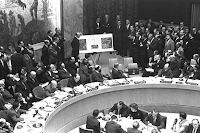 "During the Cuba missile crisis in 1962, President Kennedy came under pressure to act militarily. But a group of American scientists urged negotiations. Through British colleagues in Pugwash, a message was conveyed to the Russians offering to withdraw American missiles near the Turkish-Soviet border if the Russians removed their missiles from Cuba. Nothing was said about this at the time. However, shortly after the Soviets pulled back from Cuba, the US removed its missiles from the sensitive spots in Turkey." (Elon Salmon, "Against the Bomb," Financial Times, 11/12 February 1989.)
"During the Cuba missile crisis in 1962, President Kennedy came under pressure to act militarily. But a group of American scientists urged negotiations. Through British colleagues in Pugwash, a message was conveyed to the Russians offering to withdraw American missiles near the Turkish-Soviet border if the Russians removed their missiles from Cuba. Nothing was said about this at the time. However, shortly after the Soviets pulled back from Cuba, the US removed its missiles from the sensitive spots in Turkey." (Elon Salmon, "Against the Bomb," Financial Times, 11/12 February 1989.) Rotblat, who was Secretary General at the time of the Cuban missile crisis, did not make such direct claims. For example, in his 1972 history, Scientists in the Quest for Peace, he wrote:
[T]he Secretary-General called an emergency meeting of influential scientists from the United States and the Soviet Union to discuss means of solving the crisis. For several days he was in almost continuous telephone communication with Washington and Moscow. Such a meeting could obviously not be held without the approval of the highest authorities in the countries concerned, but this approval was very quickly obtained, and an agreement was reached to hold the meeting in London within a few days; however, the resolution of the crisis made the meeting unnecessary. While it is impossible to say how useful this meeting would have been if it had been held, the very fact that in a time of crisis it was possible to plan at very short notice, for a meeting of eminent scientists, with top level approval for it, shows the importance of the channel of communication provided by Pugwash."
Thursday 21 May 2009
Herb York (1921-2009): On Pugwash History and a NWFW
 Herb York has died. I would like to share some of his insights: about the imperative of a nuclear weapons free world, and about the Pugwash history.
Herb York has died. I would like to share some of his insights: about the imperative of a nuclear weapons free world, and about the Pugwash history.While a great deal of appropriate attention has gone to the recent ‘revival’ of the notion of a nuclear weapons free world, it is important to note that people like Herb York and others in Pugwash have been out there for decades, paving the way for the many very senior and very important recent voices calling for an eventual end to these horrendous weapons. Here is a quote from York…(from 1971!):
“[O]ur final goal must remain the ideal of general and complete disarmament….Any reasonable extrapolation of history tells us that if we keep all those weapons around they will be used. While no one can say how to get from the present situation all the way to total nuclear disarmament, it is clear that throwing weapons away heads us in the right direction and building more weapons, be they MIRVs, ABMs, or SS-9s, heads us in the wrong direction. We have fussed too much and too long about fine structure. We must begin to focus on directions rather than details.” Herb York, “A Little Arms Control Can be a Dangerous Thing,” War/Peace Report, August/September 1971, pp. 3 - 7_________________________
Following are excerpts from an interview I conducted with Herb York, 28 April 1998.
About the impact of Pugwash:
“The important thing that Pugwash did is it enabled people to meet each other at a time when there were no other good places to do that, particularly East and West. So what matters about Pugwash is not whether they got a certain idea and it doesn’t matter whether or not this idea was adopted. But what matters is that, by example, the fact that Primakov was a member of the Pugwash group and while at Pugwash John Holdren, who is now a member of the White House science advisory committee and Catherine Kelleher, who has been a defense official, were all at the same meetings. That’s what Pugwash did. It got people like them together at a time when there was no other good way for people like them to get together. … And then with others who had other different kinds of connections, like the Kapitsa father and son. The Arbatov father and son. One of the most important of those combinations was Primakov with…Shalheveth Freier….For something like five or six years immediately after the Six-Day War, the primary contact between Moscow and Jerusalem or Tel Aviv was Primakov and Freier meeting either in Pugwash meetings or using that as an alibi for meeting. They were entirely secret, these meetings. They
were fully sanctioned…by both governments. They were the primary way of getting certain detailed messages back and forth.
So the number one thing that Pugwash did was provide a venue. Now the remarkable thing about that was that a lot of people might try to do that. And anybody can identify former officials and invite them to come, but the trick that Pugwash succeeded at was inviting future officials. That’s the trick. That’s the hard part. Primakov wasn’t ex-foreign minister, he became foreign minister.”
“[T]he concrete thing…where [Pugwash was] instrumental in moving immediately to policy was in connection to the ABM Treaty of SALT I. And there it was important. and there one of the important communication channels involved Ruina and Murray Gell-Mann on our side and Millionshchikov and Artsimovich … on their side. They seriously discussed questions of ABM.”
“I thought it was reasonable [that Pugwash received the Nobel Peace Prize]. I thought that they were a likely candidate for some time….And no surprise that within Pugwash Rotblat got it. I mean, Rotblat does stand out….Without him, it probably would’ve collapsed. It’s just simply his determination that kept it going during some otherwise dry years. …Rotblat is very bossy and very opinionated and that’s what enabled him to keep Pugwash together. And it’s not just that he was like that when he was 90, he was like that when he was 70, 60. It’s not just the rigidity of old age. He’s a terribly rigid person, but he has this dedicated purpose to rid the world of nuclear weapons somehow or the nuclear threat. And it’s the kind of
thing that just seizes his whole life. He has dedicated himself to it and the result of that dedication is he kept Pugwash going. …Pugwash would’ve somehow fallen apart years ago or otherwise gotten off the track except for Rotblat’s determination.”Advice to young people:
“It’s a question of odds and the biggest thing is opportunity. Opportunities do come along, the problem is to, when you see one, ditch everything else and take it if it’s a good one. …That often takes, especially if you’re young and have a family…that can be not only gutsy but can even be harmful...if you’ve got other responsibilities. But opportunity comes to everybody and what you have to do is be ready to seize it, no matter what else you’re doing. …give up everything else that’s career-related. That’s where the talent comes in. Opportunities are related to talent in the sense that you have come to somebody else’s attention because of some talent, even if it’s just for comity, some talent. But the real trick is to then recognize the opportunity and do something about it.”
--------------------------
Please click here for the New York Times obituary (web version, 24 May 2009).
Please click here for the Physics Today obituary (21 May 2009).
Please click here for an obituary from the LA Times (21 May 2009).
Please click here for the obituary from the San Francisco Chronicle (22 May 2009).
Bruce Larkin's website contains (with Herb's permission) the full text of Race to Oblivion: A Participant's View of the Arms Race (1970). Click here for the link.
Here is "Reminiscences from a Career in Science, National Security, and the University: Conversation with Herb York," by Harry Kreisler, 6 February 1988. Click here for the link.
Sunday 17 May 2009
Toshiyuki Toyoda (1920 - 2009)
Michiji Konuma (Pugwash Japan)
 Toshiyuki Toyoda, a Japanese physicist and a Pugwashite, died on 15 May 2009 in Tokyo at the age of 89. He worked for Pugwash as a Council member from 1975 to 1987. He helped Hideki Yukawa and Sin-itiro Tomonaga organizing the 25th Pugwash Symposium "A New Design towards Complete Nuclear Disarmament" and organized the 56th Pugwash Symposium "Peace and Security in the Asia-Pacific Region". He attended 26 Pugwash meetings in total from the 7th Conference held at Stowe, USA in 1961 to the 45th Annual Conference held at Hiroshima, Japan in 1995.
Toshiyuki Toyoda, a Japanese physicist and a Pugwashite, died on 15 May 2009 in Tokyo at the age of 89. He worked for Pugwash as a Council member from 1975 to 1987. He helped Hideki Yukawa and Sin-itiro Tomonaga organizing the 25th Pugwash Symposium "A New Design towards Complete Nuclear Disarmament" and organized the 56th Pugwash Symposium "Peace and Security in the Asia-Pacific Region". He attended 26 Pugwash meetings in total from the 7th Conference held at Stowe, USA in 1961 to the 45th Annual Conference held at Hiroshima, Japan in 1995.For many years Toyoda was a member of the Board of Sponsors for Bulletin of the Atomic Scientists. He worked on theoretical nuclear and elementary particle physics. He was Professor Emeritus of Nagoya University. He served as Director of the Peace Research Institute of Meiji Gakuin University, Tokyo.
Toyoda published many articles and books on physics and on issues concerning nuclear weapons including "Criticism on Nuclear Strategy". The funeral ceremony will be held in Tokyo on 21 May 2009.
-------------------------
Picture is the cover of the book edited by William Epstein and Toyshiyuki Toyada following the 1975 Kyoto Pugwash Workshop, August 28 to September 1 1975. The symposium dealt with the subject ‘A New Design Towards Complete Nuclear Disarmament: The Social Function of Scientists and Engineers.’ Spokesman Books, 1977.
You can read an interesting article here by Prof. Toyoda, "Scientists Look at Peace and Security", Bulletin of the Atomic Scientists, Vol 40, No. 2, February 1984, pp 16 - 19. The article outlines the post War movement among scientists in Japan, and mentions the role of leading Japanese Pugwashites, such as Hideki Yukawa and Sin-itiro Tomonaga. Toyoda concludes the article by saying,
"The role of conscientious scientists in Japan is...becoming more important than ever."
Sunday 3 May 2009
Manifesto in Many Languages
(The link to 'signing the manifesto' is a bit odd, and not a Pugwash-authorized activity...)
http://www.youtube.com/watch?v=3fQ17Mbbtk8
Sunday 5 April 2009
Obama Catches Up With Vision of Pugwash Founders?
Today Obama said,
"There are those who doubt whether true international cooperation is possible, given inevitable differences among nations. And there are those who hear talk of a world without nuclear weapons and doubt whether it's worth setting a goal that seems impossible to achieve. But make no mistake: We know where that road leads. When nations and peoples allow themselves to be defined by their differences, the gulf between them widens. When we fail to pursue peace, then it stays forever beyond our grasp. We know the path when we choose fear over hope. To denounce or shrug off a call for cooperation is an easy but also a cowardly thing to do. That's how wars begin. That's where human progress ends."Here is an excerpt of the 1958 Vienna Declaration (which Rotblat called the "tenet" or "credo" of the Pugwash movement) that shows not just Pugwash optimism, but also Pugwash pragmatism about the road to disarmament:
"The armaments race is the result of distrust between states; it also contributes to this distrust. Any step that mitigates the arms race, and leads to even small reductions in armaments and armed forces, on an equitable basis and subject to necessary control, is therefore desirable. … We recognize that the accumulation of large stocks of nuclear weapons has made a completely reliable system of controls for far-reaching nuclear disarmament extremely difficult, perhaps impossible. For this disarmament to become possible, nations may have to depend, in addition to a practical degree of technical verification, on a combination of political agreements, of successful international security arrangements, and of experience of successful cooperation in various areas. Together, these can create the climate of mutual trust, which does not now exist, and an assurance that nations recognize the mutual political advantages of avoiding suspicion."
I'll return to the Vienna Declaration in other posts, as it many other important elements...
Did you know? At the end of the Third Pugwash Conference, a meeting with about 10,000 people took place in the Vienna City Hall Auditorium, the largest Pugwash conference attendance ever.
Check it out: I just discovered this Oregon State University Special Collections web site that shows Linus Pauling's suggested draft revisions for the Vienna Declaration. Rotblat in the short 1962 history* says this statement was first drafted by Eugene Rabinowitch, with comments from others prior to the meeting. Szilard, following a quirky tradition of his own, ultimately abstained from signing.
*J. Rotblat, Science and World Affairs: History of the Pugwash Conferences, London: Dawsons of Pall Mall, 1962.
McNamara on Pugwash Role in Vietnam
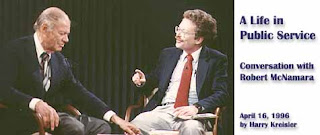 In a little known initiative, Pugwash provided a back channel (code named PENNSYLVANIA) between two French men and Ho Chi Minh during the Vietnam War.
In a little known initiative, Pugwash provided a back channel (code named PENNSYLVANIA) between two French men and Ho Chi Minh during the Vietnam War. "But what the public wasn't aware of, which I couldn't really describe or discuss when I left, was that we were engaged in very delicate negotiations. ... They had been triggered, oddly enough, by a visit that Henry Kissinger, who was then a professor at Harvard, had made to a Pugwash meeting in Paris. ... [T]hey were meeting in Paris in the summer of 1967. Kissinger was there, and he was approached by two Frenchmen, Herbert Marcovich and Raymond Aubrac*, whom I cite in the book, who said, "If the U.S. has a message to take to Ho Chi Minh, we'll deliver it." Now to illustrate the degree to which we didn't understand the situation in Vietnam at the time, today I believe that Ho Chi Minh was more of a nationalist, more of a Tito, than a servant or a follower of Khruschev. But at that time, we looked upon him as a vassal of the Soviets. He had lived in Paris during World War II, he had lived with this man Aubrac; he was the godfather of Aubrac's child. (By the way, Ho Chi Minh had been a pastry cook in the Savoy Hotel in London, and he lived in this country for a time.) There's a real possibility that if we had understood him better we could have avoided this war, or, after it started, we could have terminated it. It illustrates my point of how little we knew and understood the Vietnamese. But to come back to my point, I said to President Johnson "I know you think there's nothing in this, sir, but let me handle it. Something might come of it. I promise not to get us in trouble; let me handle it." So I engaged in a long series of exchanges with Kissinger with the full knowledge of the Secretary of State and the President over a period of months. "
"Our efforts failed, and I suggest why in the book: in part because we were clumsy and in part because maybe there was nothing in it, I don't know. But I know we were clumsy. In any event, our efforts failed, but they were still continuing when I left. After I left, the President, in March of 1968, made a speech in San Antonio in which he put forward publicly the elements of the proposal that we had put forward recretly through Kissinger to Ho Chi Minh, which became known as the San Antonio formula. That ultimately was the foundation for the start of the negotiations between North Vietnam and the U.S. in Paris. That was under way when I left; I couldn't talk publicly about it. As Secretary of Defense, when the United States was in the midst of a war with 500,000 American young people's lives at risk, in the
midst of a war in a foreign country, I couldn't speak candidly or freely without self-constraint." (emphasis added)*Some archival research indicates that this question of who contacted whom is a bit more complicated than this, but I will save that for another post!!
Recommended reading: Robert McNamara, James Blight, Robert Brigham, Argument Without End, Public Affairs, 2000, pp. 292-301. Photo above from the Kreisler interview website.
Saturday 4 April 2009
Schaerf on Founding ISODARCO with Amaldi
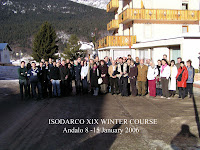 In the 1960s, Edoardo Amaldi and Carlo Schaerf founded the International School on Disarmament and Research on Conflicts (ISODARCO), a project of the Italian Pugwash Group. In a recent video taped interview conducted by Marco De Andreis for La fondazione Ugo La Malfa, Carlo discusses the history and future of ISODARCO (please click here for the You Tube link).
In the 1960s, Edoardo Amaldi and Carlo Schaerf founded the International School on Disarmament and Research on Conflicts (ISODARCO), a project of the Italian Pugwash Group. In a recent video taped interview conducted by Marco De Andreis for La fondazione Ugo La Malfa, Carlo discusses the history and future of ISODARCO (please click here for the You Tube link).If you might be able to conduct interviews for the Pugwash History Project, please contact me. Equally, if you have insight into particular aspects of the history of Pugwash, please get in touch, and perhaps we can arrange for a Skype interview, or some other creative use of technology...
ABM Treaty
Metta Spencer highlights one instructive example regarding Pugwash and the ABM Treaty, in an excellent article called "Political Scientists":
"Millionshchikov ... noted that he had privately come around to the anti-ABM position in 1964 during a Pugwash meeting ... By the time of the Pugwash Conference in Sochi in October 1969 ... Millionshchikov definitely said he opposed ABM systems. ... A month after the Pugwash meeting in Sochi, the Strategic Arms Limitation Talks began in Helsinki. One outcome was the ABM Treaty of 1972..."See Metta Spencer, "Political Scientists", Bulletin of the Atomic Scientists, July/Aug 1995, Vol 51, No 4, p. 62.
Rotblat & Szilard, First Pugwash Conference, 1957
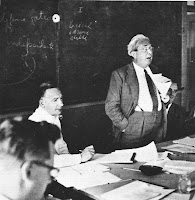 Szilard played an important role in the First Pugwash Conference and the development of the Pugwash Movement.
Szilard played an important role in the First Pugwash Conference and the development of the Pugwash Movement.Szilard’s biographer, William Lanouette, wrote that the Pugwash meeting was “the international forum that finally coupled Szilard’s eclectic brainstorming with his fervent desire to curb the U.S.-Soviet arms race”. Quoting Lanouette again, "…the Russians quickly warmed to Szilard’s candor and wit. ‘They really loved Leo,’ recalled Ruth Adams, an editor at the Bulletin who attended the First Pugwash Conference and many to follow. ‘He never tried to disguise anything, and they appreciated that.’"
William Lanouette with Bela Silard, Genius in the Shadows. 587 pages, Scribner's, New York, 1992, ISBN 0-684-19011-7. For a review, see: David Hafemeister, American Journal of Physics, Sept 1993 (reprinted Physics and Society Newsletter, Jan 1994.)
Rotblat: Leaving the Bomb Project (and not an absolute pacificist)
Leaving the Manhattan Project was a courageous step for Rotblat, and one with serious personal implications. He was accused of being a spy, his personal belongings mysteriously 'disappeared' on his train ride home, and he was not allowed to tell his fellow Project scientists why he was leaving.
"Chadwick ... was shown a thick dossier on me with highly incriminating evidence. It boiled down to my being a spy: I had arranged with a contact in Santa Fe to return to England, and then to be flown to and parachuted onto the part of Poland held by the Soviets, in order to give them the secrets of the atom bomb. ..."People are often surprised to hear that Prof said he would not rule out working on a similar weapon again in the future. I suspect this was his scientific precision and exact language more than anything else:
"After 40 years one question keeps nagging me: have we learned enough not to repeat the mistakes we made then? I am not sure even about myself. Not being an absolute pacifist, I cannot guarantee that I would not behave in the same way, should a similar situation arise."
Frisbee Diplomacy
"In the patio behind the Orante Intourist Hotel at the Black Sea resort of Sochi, an American scholar and a leading Soviet physicist were skimming a Frisbee at each other. The Russian, Mikhail Dmitrievich Millionshchikov, had approached the game hesitantly, perhaps because the American. Columbia University's Marshall Shulman, a specialist in Russian affairs, had demonstrated such skill. But soon Millionshchikov was lunging enthusiastically after the elusive plastic saucer. ..."
Please post comments if you have perspectives on the Sochi meeting.

